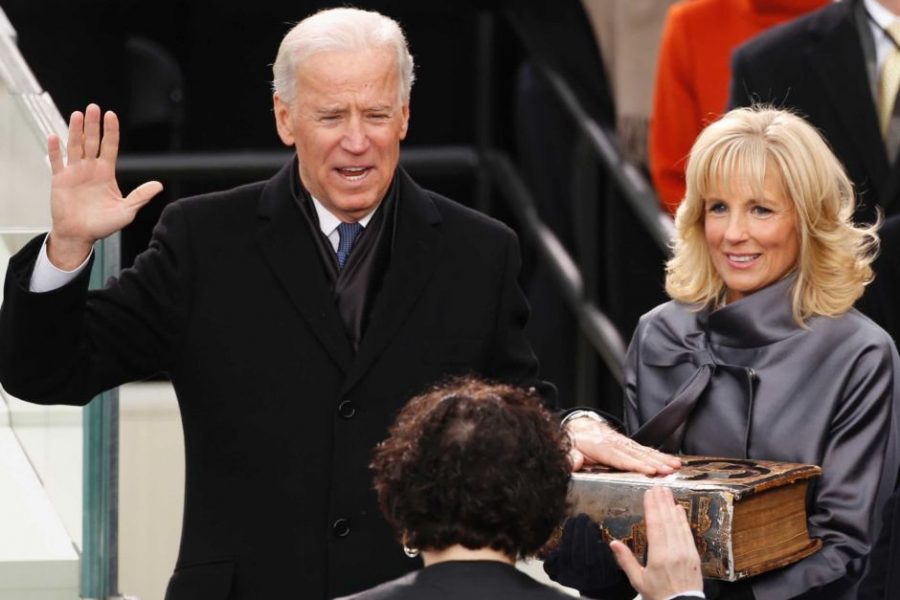Washington D.C. and state capitals on high alert for inauguration day on the heels of Capitol Building assault
Security will be heightened for the Jan. 20 inauguration of Joe Biden as the 46th president of the United States. He is pictured here with his wife, Dr. Jill Biden, at his 2013 inauguration for his second term as vice-president.
With Inauguration Day around the corner, outgoing president Donald Trump still struggles to accept defeat. As he watches the construction in his backyard of the stage on which his opponent, Joe Biden, will be inaugurated on January 20, Trump continues to claim that the 2020 presidential election yielded fraudulent results.
But due to recent events and the president’s continuous denial, there is concern among many that Trump’s supporters are planning an Inauguration Day repeat of the events of January 6 when a mob of Trump supporters laid siege to the Capitol Building, encouraged by Trump himself.
At a Trump rally called the “Rally to Save America” held the morning of January 6 on the White House Ellipse, Trump continued to spread false stolen-election conspiracy theories and told the fired-up crowd of thousands that will never admit defeat.
The most profound part of the rally was when Trump encouraged his supporters to march to the Capitol Building and “make their voices heard” and “to fight like hell.” He even told the crowd that he would march with them. While he didn’t live up to that promise, his promise that the march would be “wild” was definitely upheld.
In the weeks leading up to January 6, Trump also pressured Vice President Mike Pence, whose job that day was to oversee the counting of the Electoral College votes from each state and announce who won the majority of the votes, to nullify the Electoral College votes. “All Vice President Pence has to do is send it back to the states to recertify and we become president and you are the happiest people,” Trump told his supporters, further spreading untruths as the vice-president does not have the power to solely overturn electoral votes.
Legislators were all but surprised when a mob of Trump supporters stormed the building to protest the certification of Biden’s win. The rioters charged through a barricade, attacked officers, broke windows, and even sat at the desks of legislators during the violent breach of national security that was incited by the president himself.
According to a new court filing by federal prosecutors, some of the rioters who seized the Capitol last week came with the intention “to capture and assassinate elected officials.” They came armed and equipped with flex cuffs or zip-tie handcuffs. Many of the rioters were affiliated with white supremacist groups, including the Proud Boys and QAnon. President-Elect Joe Biden and many others acknowledged and condemned the impact of race in the rioters’ success.
“No one can tell me that if it had been a group of Black Lives Matter protesters yesterday,” declared Biden, “they would have been treated very, very differently than the mob of thugs that stormed the Capitol.”
The president did not discourage the mob; rather, he posted a now-deleted video message on Twitter hours into the riot, in which he called the rioters “special” and told them to go home. It has also been reported through several media outlets that Trump refused six requests to authorize the use of the National Guard before finally giving in at the insistence of some of his advisers. Many would agree that this response is unconventional for a leader watching a mob of rioters attempt to take over the U.S. Congress.
The siege of the Capitol building, widely being referred to as an attempted coup, generated widespread worry that this already intense situation would only be the beginning, and that Trump will not leave the White House quietly.
It was already a topic of discussion about whether Trump will even attend Biden’s inauguration. But on January 8, Trump ended the speculation by saying he has chosen to not attend the inauguration. Biden said the president’s decision was “a good thing,” considering the events of the days prior.
But even with Trump not in attendance on January 20, many people are concerned with what his supporters may try to pull during Biden’s swearing in ceremony. After the siege at the Capitol, there is no telling how far Trump’s followers will go.
Soon-to-be Senate Majority Leader Chuck Schumer said, “The threat of violent extremist groups remains high and the next few weeks are critical in our democratic process with the upcoming inauguration.”
Trump supporters are planning on armed protests at the capitals of all 50 states and the U.S. Capitol between now and Inauguration Day. The FBI found that a group of rioters is also planning on storming federal offices and government buildings should Trump be removed from office ahead of Inauguration Day.
Speculators are especially concerned over what necessary security measures must be taken on Inauguration Day, especially considering the animosity Trump supporters appear to have for President-Elect Biden.
Washington D.C. Mayor Muriel Bowser sent a letter to the Department of Homeland Security calling for the extension of the period for increased national security surrounding the inauguration from three days to two weeks. She also wants requests for public gathering permits to be rejected during those two weeks.
According to Voice of America, Bowser describes her calls for increased security “essential to demonstrating our collective resolve in ensuring the constitutional transition of power.” The extra security will help greatly, but it does not appear as though there will be a peaceful transition of power.
Up until a Jan. 13 call made at the urging of his advisers and Republican Congresspersons for his supporters to remain peaceful during their inauguration protests, Trump has done all but show that he will support a peaceful transition of power since even before his loss in November. The peaceful transition of power is a political tradition that has been carried out since the first president, George Washington, chose to step down from the presidency after serving two terms.
The Presidential Transition Act, as explained by Congress in 1963, states that, “Any disruption occasioned by the transfer of the executive power could produce results detrimental to the safety and well-being of the United States and its people.” Trump’s behavior since November has demonstrated the “detrimental” results of the absence of a peaceful transition.
Trump was banned from Twitter following the Capitol riot, but on January 7, he tweeted a statement through Dan Scavino, saying that he now promises an “orderly transition” of power despite his disagreement with the election’s outcome. Even so, the damage has been done. Trump supporters are angry and the president did nothing but fan the flames of their rebellion.
This election has been unlike any other, but to the dismay of Trump and his followers, Joe Biden and Kamala Harris will be sworn in as the new President and Vice President of the United States on Wednesday, January 20.









